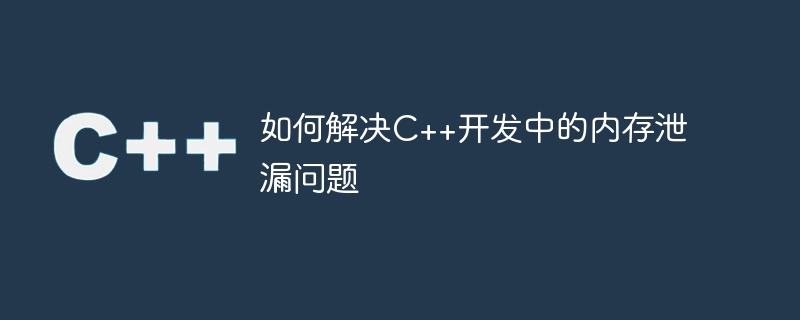
How to solve the memory leak problem in C development
In C development, memory leak is a common problem, which will cause the memory allocated during program running It cannot be released, eventually causing the memory space to be exhausted and the program to crash. This article will introduce several common methods to solve memory leak problems.
- Establish good programming habits
Good programming habits can help us avoid memory leaks as much as possible during the process of writing code. For example, when using dynamic memory allocation, we should always remember to release the memory when it is no longer needed. At the same time, avoid using raw pointers and use smart pointers to manage the release of resources.
- Using smart pointers
C 11 introduces smart pointers, which can automatically manage the release of memory and avoid the tedious operation of manually releasing memory. There are three types of smart pointers: shared_ptr, unique_ptr and weak_ptr. Among them, shared_ptr can be used to share the same object with multiple pointers, unique_ptr exclusively owns an object, and weak_ptr represents a weak reference and will not increase the reference count of the object. By using smart pointers, the process of memory management can be greatly simplified and the risk of memory leaks can be reduced.
- Pay attention to the life cycle of resources
When writing code, we need to pay attention to the life cycle of each resource to ensure that the resource is released normally when it is no longer used. A common problem is forgetting to release related resources, such as files, database connections, etc., in the object's destructor. Therefore, when designing a class, the release of resources should be placed in the destructor to ensure that resources can be released normally when the object is destroyed.
- Use RAII (resource acquisition is initialization) principle
The RAII principle is a programming technique in C, which can ensure the correct release of resources. The basic idea of this principle is to obtain resources in the object's constructor and release them in the destructor. By using the RAII principle, you can avoid resource leaks and ensure that the program can correctly release resources under any circumstances.
- Use memory leak detection tools
In addition to the above methods, we can also use some memory leak detection tools to help us discover and solve memory leak problems in time. Some commonly used memory leak detection tools include Valgrind, Dr. Memory, and GDB. These tools can help us detect memory leaks in our programs and provide detailed error reports to facilitate debugging and repair.
To sum up, solving the memory leak problem in C development requires us to establish good programming habits, use smart pointers, pay attention to the life cycle of resources, adopt RAII principles, and use memory leak detection tools and other methods. Through the combined use of these methods, we can better solve the memory leak problem and improve the stability and reliability of the program.
The above is the detailed content of How to solve memory leak problems in C++ development. For more information, please follow other related articles on the PHP Chinese website!






